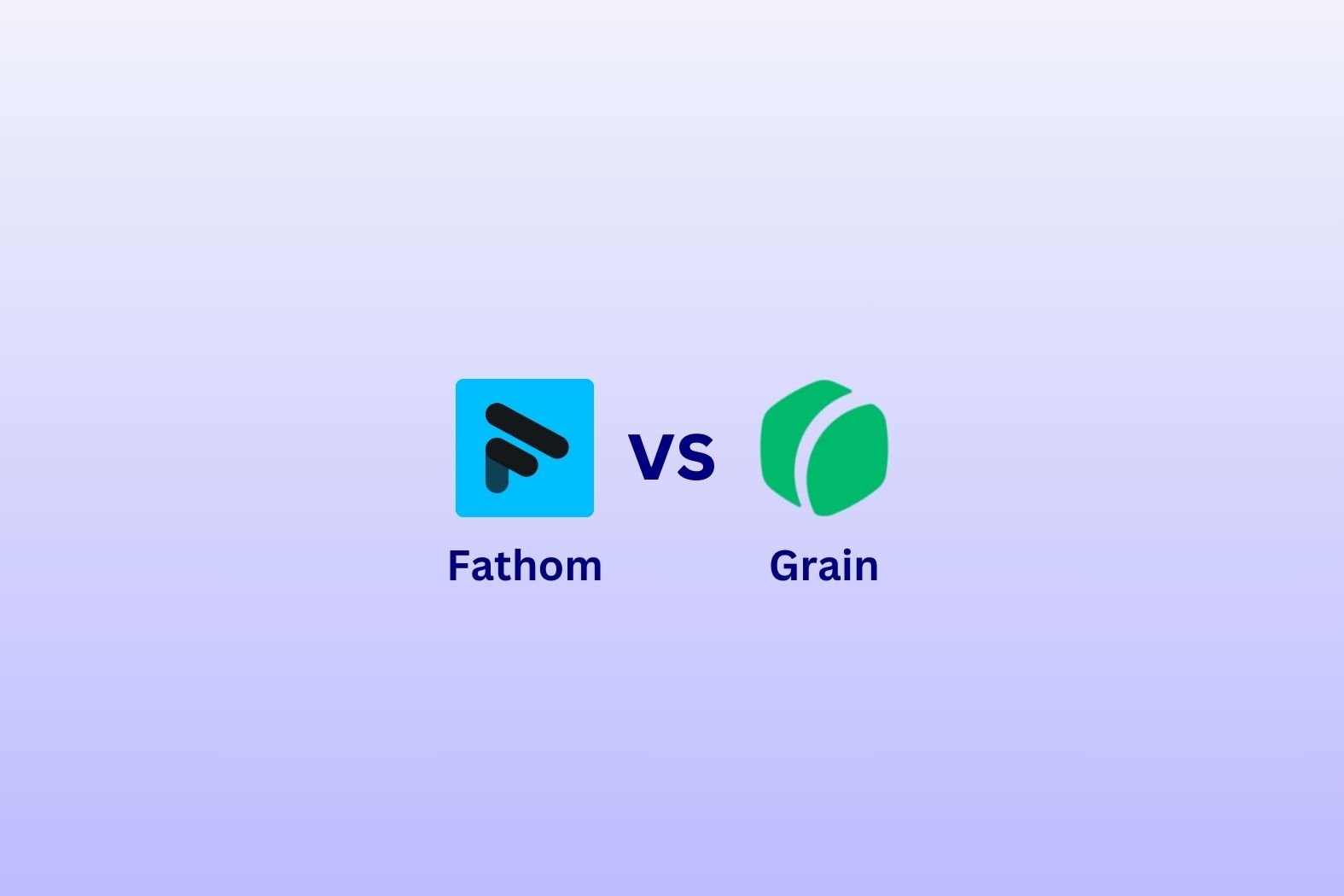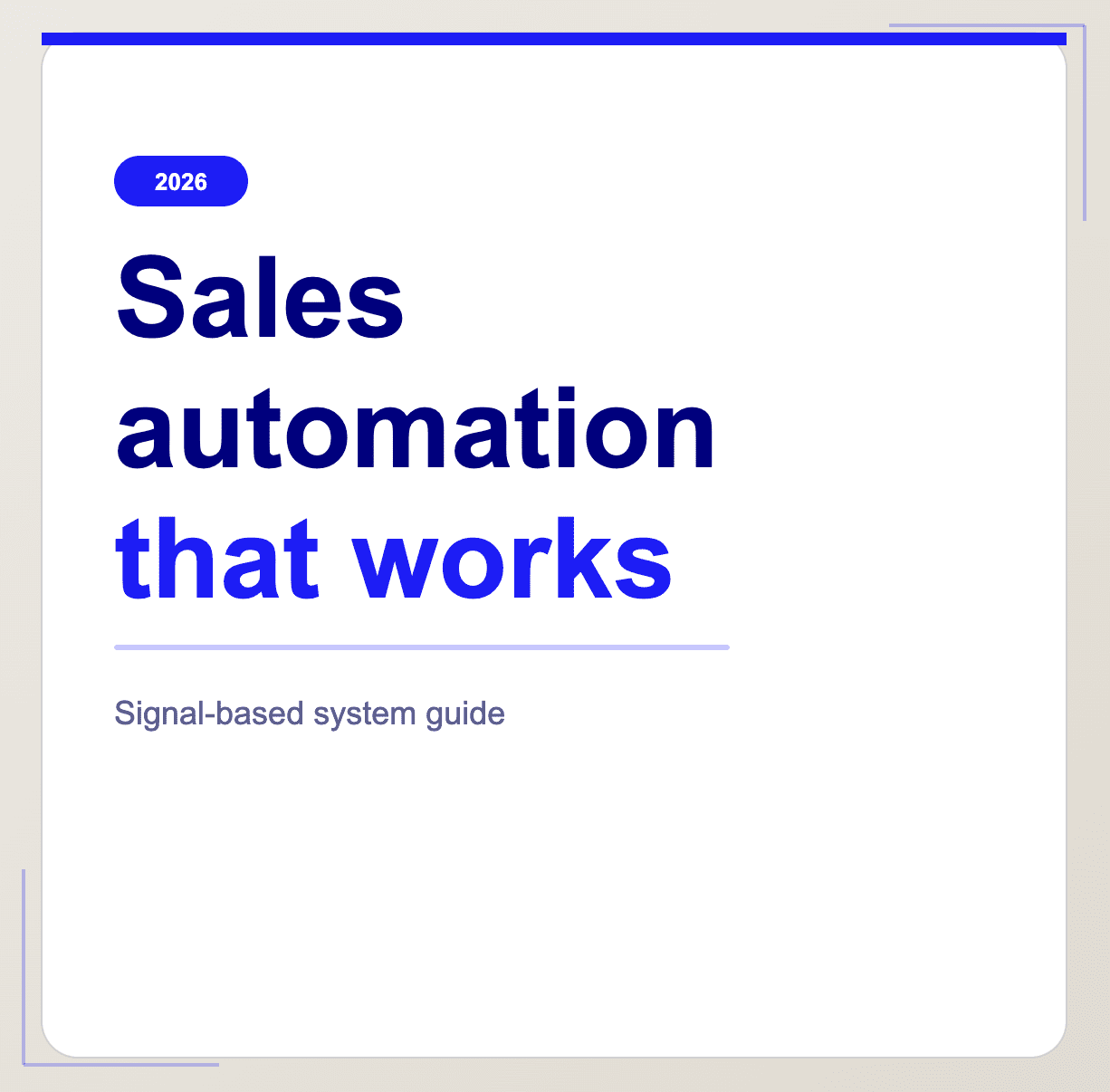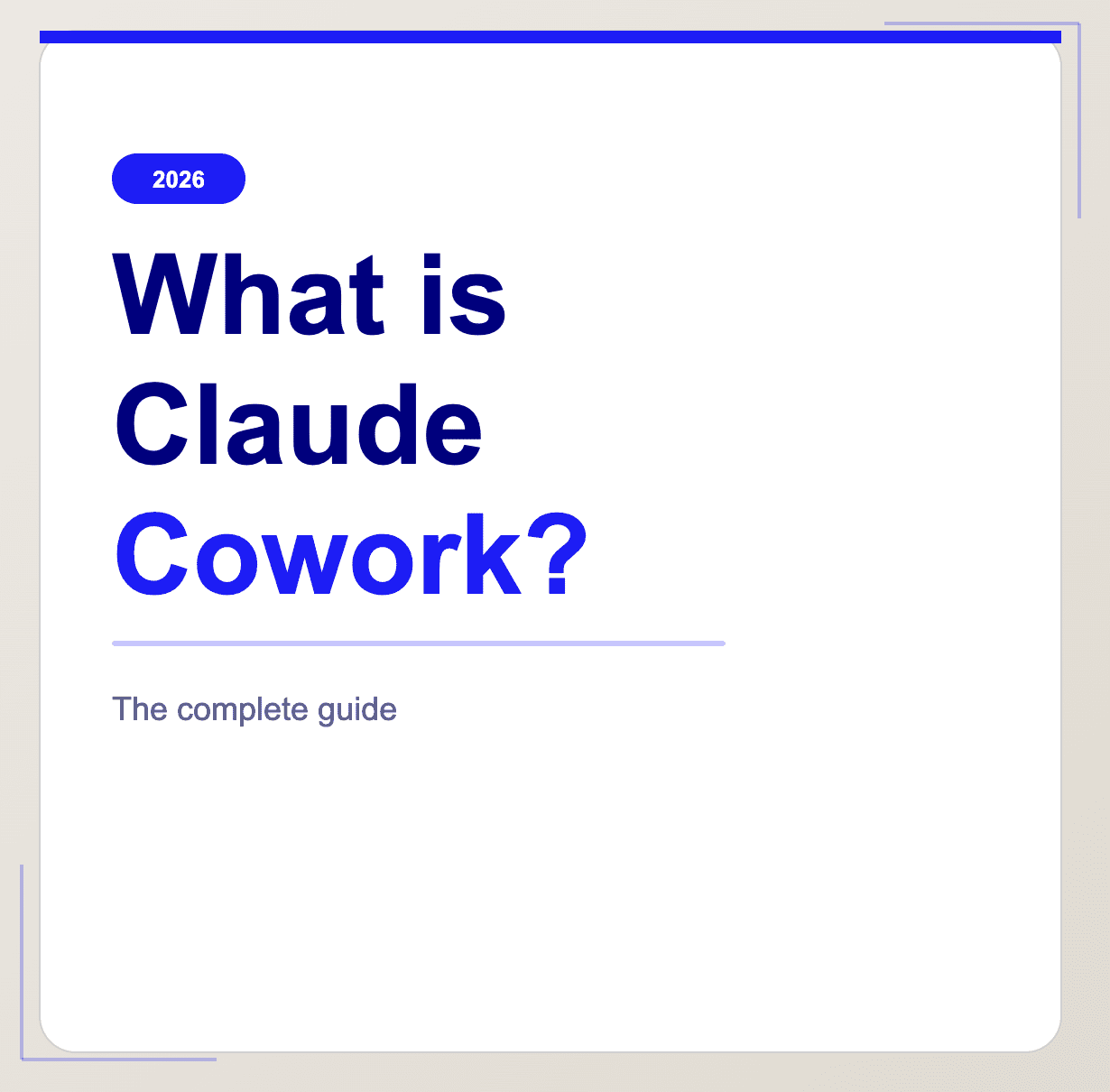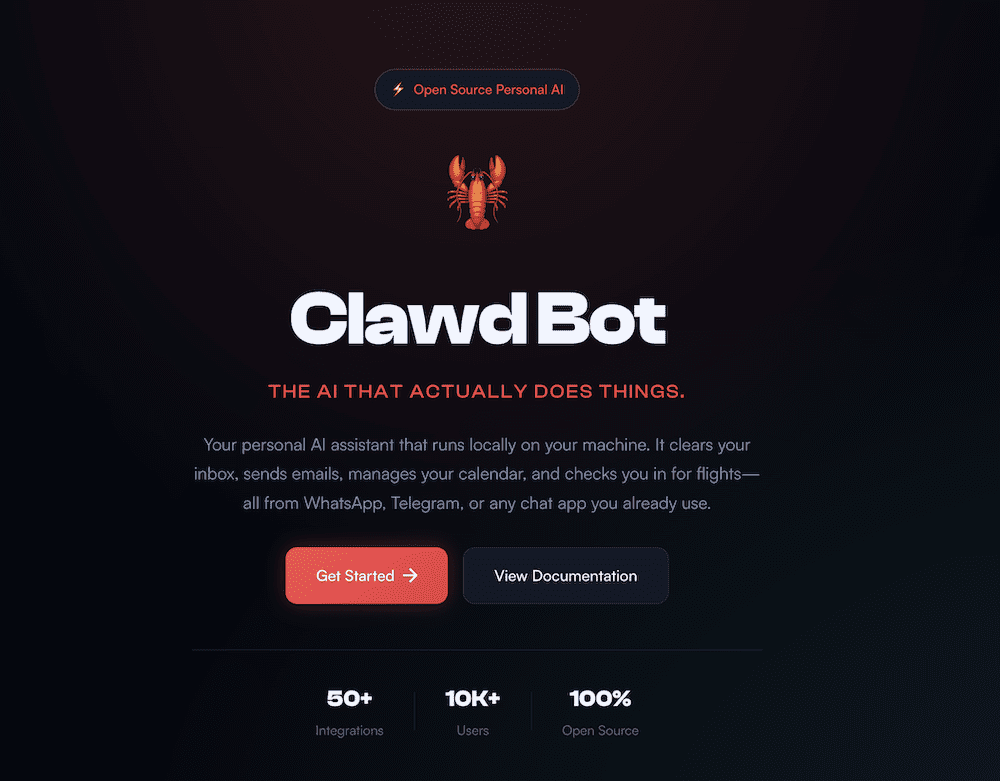In this Fathom vs Grain showdown, both stand out as powerful AI-driven tools designed to enhance meeting productivity through transcription, recording, and conversation intelligence.
However, despite their similarities, there are key differences that set them apart.
In this comparison, we’ll explore these differences across multiple dimensions, including automation, integrations, organizational features, and more.
By the end of this analysis, you’ll have a clear understanding of what makes each tool unique and which one best suits your needs. Keep reading to discover more!
tl;dr
| Fathom | Grain | |
|---|---|---|
| Transcription | 19 | 22 🟢 |
| Recording | 12 | 14 🟢 |
| Conversational Intelligence | 11 | 11 |
| Automation & Integrations | 8 🟢 | 4 |
| Note-taking | 8 | 8 |
| Security | 8 | 8 |
| Coaching | 0 | 2 🟢 |
| Admin | 2 | 4 🟢 |
| Organizational | 9 | 12 🟢 |
| Support | 4 🟢 | 3 |
| Revenue Intelligence | 0 | 3 🟢 |
| Other | 6 🟢 | 3 |
| Total | 87 | 94 🟢 |
When we put Fathom and Grain head to head, Grain came out on top with a total score of 94, surpassing Fathom’s 87. Grain stands out in transcription accuracy, recording, and organizational features, making it a strong choice for teams looking for detailed meeting insights and structured collaboration.
Grain also has the edge for sales and revenue teams, but only because Fathom lacks any sales-specific features whatsoever.
That said, Fathom has its own strengths, particularly in automation, integrations, and support, making it a great option for those who prioritize workflow efficiency and seamless connectivity with other tools.
Both platforms bring valuable features to the table, but the best choice depends on your specific needs. Below, we break down their key differences to help you decide which tool is the right fit.
Fathom vs Grain: 12 Factors to Consider While Choosing the Best AI Notetaker
How do we rank?- We give 2 points to a platform once it is the clear winner or when the capability is equally met by the other.
- We give 1 point when the capability is present, but it’s not a winner.
- We give 0 points when the capability is not present.
Transcription Capabilities
| Fathom (19) | Grain (22) | |
|---|---|---|
| Transcriptions included | 🟢 Unlimited free | 🟠 Unlimited (Starter Plan+) |
| Real-time transcriptions | 🟢 | 🟢 |
| Languages supported | 🟠 28 | 🟢 100+ |
| Dialects supported | 🔴 | 🔴 |
| Filler word removal | 🔴 | 🟢 |
| Speaker recognition | 🟢 | 🟢 |
| Speaker names | 🟢 | 🟢 |
| Transcribe video/audio uploads | 🟢 limited 300 min/month free | 🟠 (0 free, unlimited Business) |
| Export transcripts | 🟢 | 🟢 |
| Clips from transcript | 🟢 | 🟢 |
| Custom vocabulary | 🔴 | 🟢 |
| Full-Transcript search | 🟢 | 🟢 |
| Edit transcription | 🟢 | 🟢 |
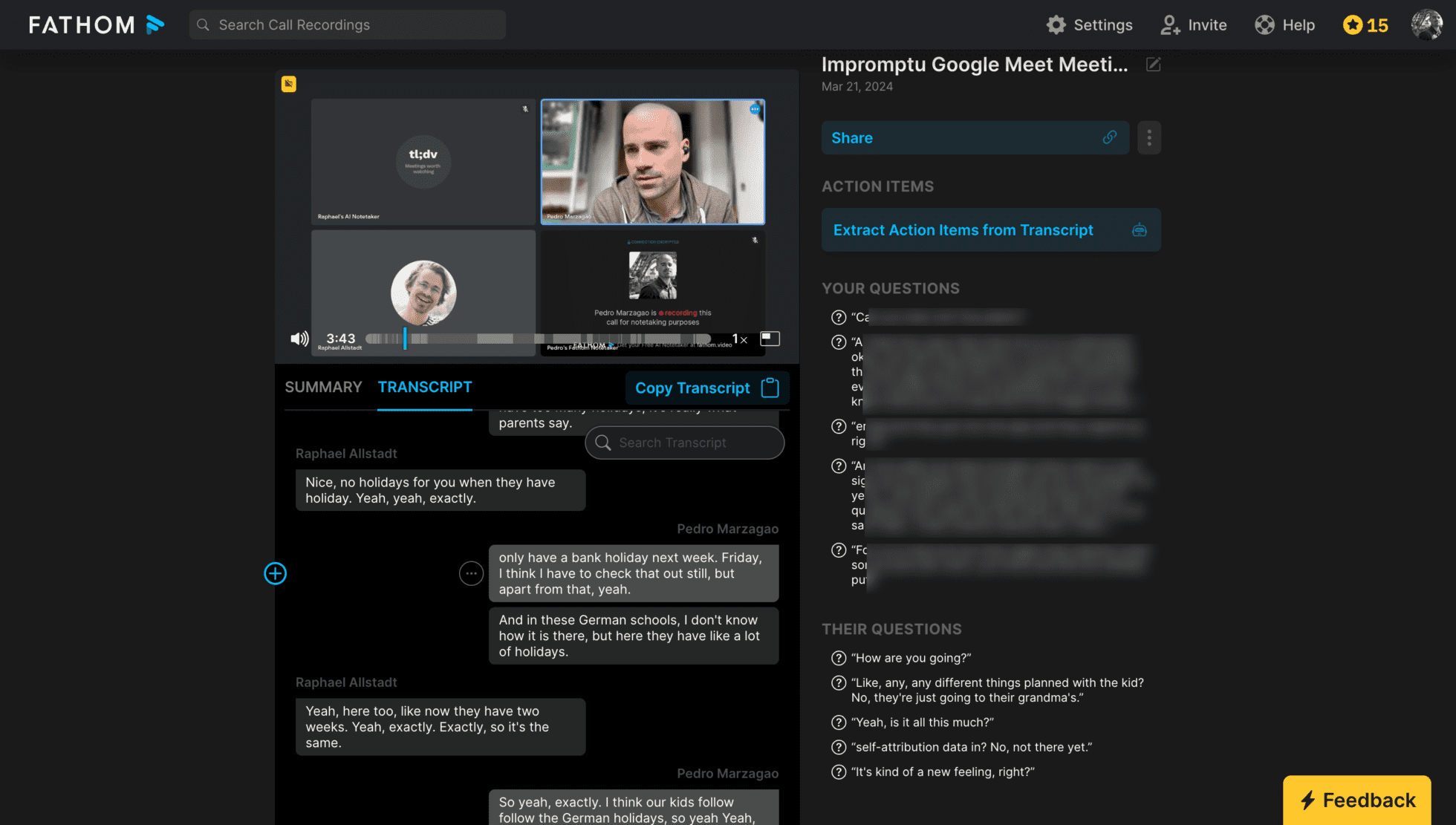
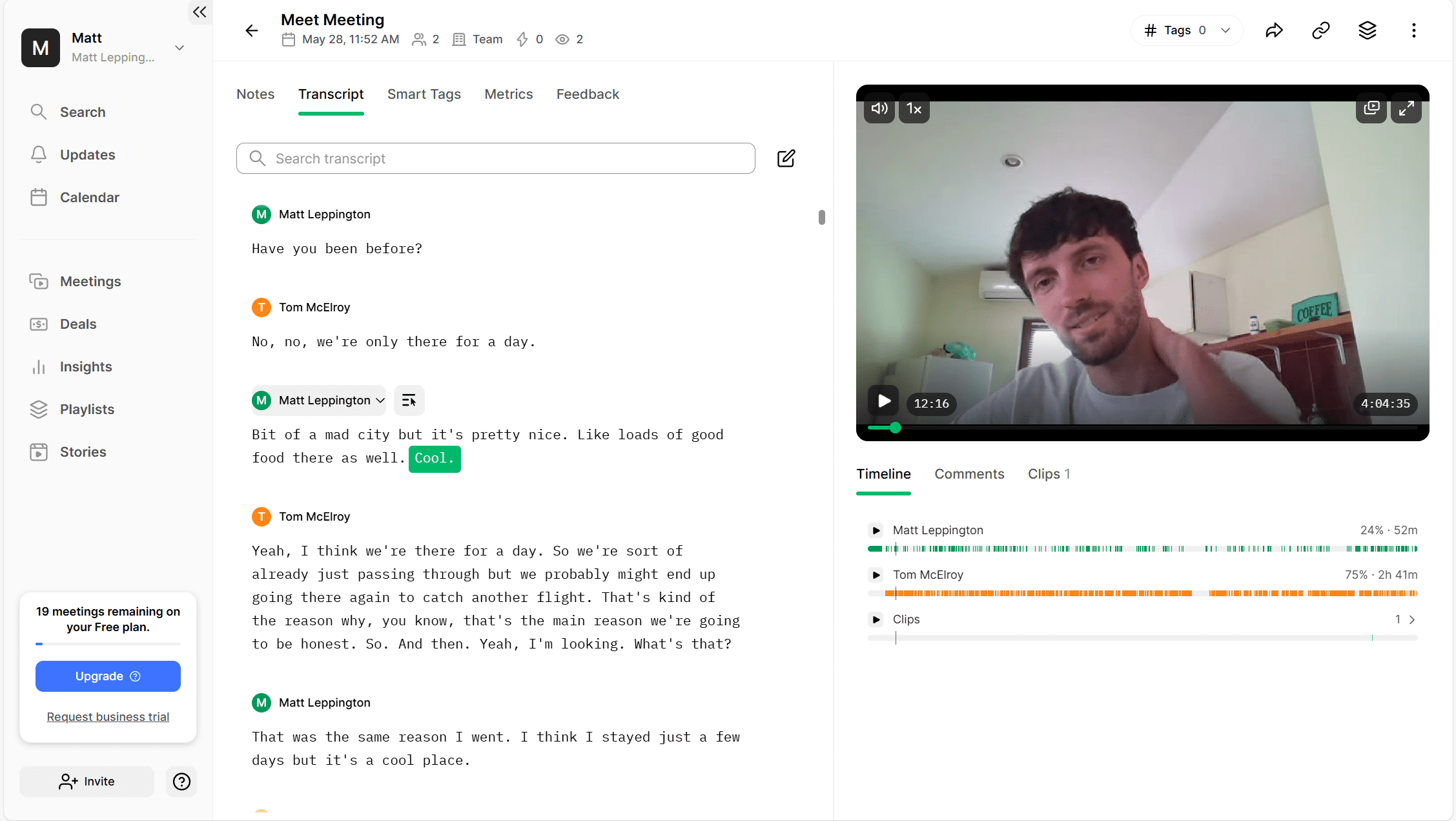
Transcriptions Included
Fathom provides unlimited free transcriptions for all users, making it an attractive option for individuals and teams looking for cost-effective meeting documentation.
Grain also offers unlimited transcriptions, but only on its Starter Plan and higher tiers. Free-tier users are limited to a measly one transcription.
Real-time Transcriptions
Both Fathom and Grain offer real-time transcription capabilities, ensuring users can follow along with live conversations and capture key insights instantly. This feature is particularly useful for live note-taking and immediate content sharing.
Languages Supported
Grain takes the lead in language support, offering transcription in over 100 languages, making it ideal for international teams and multilingual environments. In contrast, Fathom supports 28 languages, which, while still substantial, falls short of Grain’s extensive coverage.
It’s worth mentioning, however, that Grain’s languages are divided into three categories: First Class, Normal, and Experimental. There are only seven First Class languages, which are the most optimized. The Normal category contains the most languages, and Grain is open about the fact that these may contain some small errors relating to punctuation and proper nouns. The Experimental category is better used for general transcripts, but there will be errors.
Dialects Supported
Neither Fathom nor Grain currently supports dialect recognition, meaning transcription accuracy may vary for users with strong regional accents or specific dialects.
Filler Word Removal
Grain stands out with built-in filler word removal, allowing users to generate cleaner and more concise transcripts by eliminating unnecessary “um’s” and “uh’s.”
Fathom, on the other hand, does not offer this feature, meaning its transcripts may require more manual editing for clarity.
Transcribe Video/Audio Uploads
Fathom provides limited transcription for uploaded video and audio files, offering 300 free minutes per month before requiring an upgrade. While this isn’t great, it’s better than Grain, which allows unlimited transcription of uploads, but only on its Business Plan. Free-tier users don’t get access to this feature at all.
Clips from Transcript
Both Fathom and Grain enable users to create clips from transcripts, allowing teams to extract and share key moments from conversations efficiently. This is a brilliant feature for instantly sharing the most important clips from a meeting.
Custom Vocabulary
Grain offers custom vocabulary functionality, enabling users to train the AI to recognize industry-specific jargon, acronyms, and unique terminology. This can significantly improve transcription accuracy for specialized fields.
Fathom, however, does not support custom vocabulary, which may result in less accurate transcriptions for technical or niche discussions.
Recording Capabilities
| Fathom (12) | Grain (14) | |
|---|---|---|
| Video platforms | 🟢 Zoom, MS Teams, Google Meet | 🟢 Zoom, MS Teams, Google Meet |
| Storage | 🟢 Unlimited | 🟢 Unlimited |
| Records video | 🟢 | 🟢 |
| Concurrent meetings | 🔴 | 🔴 |
| Download recordings | 🟢 | 🟢 |
| Capture slides | 🔴 | 🔴 |
| Viewing analytics | 🔴 | 🔴 |
| Integrated Calendar | 🔴 | 🟢 |
| Recording Editing | 🟢 | 🟢 |
| Reels | 🟢 | 🟢 |
| Custom Bot Avatar | 🔴 | 🔴 |
Storage
Both platforms offer unlimited storage, meaning users don’t have to worry about running out of space when saving past recordings. This is a significant advantage for teams that rely on extensive meeting documentation.
Concurrent Meetings
Neither Fathom nor Grain supports concurrent meeting recordings, meaning users can only record one meeting at a time per account. This limitation may be a drawback for larger teams or organizations running multiple meetings simultaneously.
If concurrent meeting support is a priority, it might be better to look at other Fathom and Grain alternatives, like tl;dv, which provides support for an unlimited amount of concurrent meetings (fair usage limits apply).
Capture Slides
Neither Fathom nor Grain offers automatic slide capture, meaning users looking to document presentation slides will need to rely on manual screenshots or external tools.
Viewing Analytics
Both Fathom and Grain lack built-in viewing analytics, so users cannot track engagement metrics such as who watched the recording or how much of it was viewed.
Again, tl;dv is an option here for users that want to monitor the way their team interacts with call recordings. It has a stronger free plan than both Fathom and Grain, allowing you to get started straight away.
Integrated Calendar
Grain holds an edge in this category, offering an integrated calendar feature that helps users manage and schedule recordings more efficiently. Fathom does not currently provide this functionality.
Reels
Both Fathom and Grain support the creation of reels, enabling users to highlight and compile the most important parts of a meeting into easily digestible clips.
Custom Bot Avatar
Neither platform offers a custom bot avatar feature, meaning recordings will display the default system bot rather than a personalized or branded identity. If you require a personalized bot, you’ll have to look at AI meeting assistants like tl;dv.
Conversation Intelligence Capabilities
| Fathom (11) | Grain (11) | |
|---|---|---|
| Single Meeting AI Insights | 🟢 | 🟢 |
| Multi Meeting AI Insights | 🔴 | 🔴 |
| Keyword tracking | 🟠 in Team edition | 🟠 in Business Plan |
| Sentiment Analysis | 🔴 | 🔴 |
| Key Topic detection | 🟢 | 🟢 |
| Speech Analytics | 🟢 | 🟢 |
| Action item detection | 🟢 | 🟢 |
| Question detection | 🟢 | 🟢 |
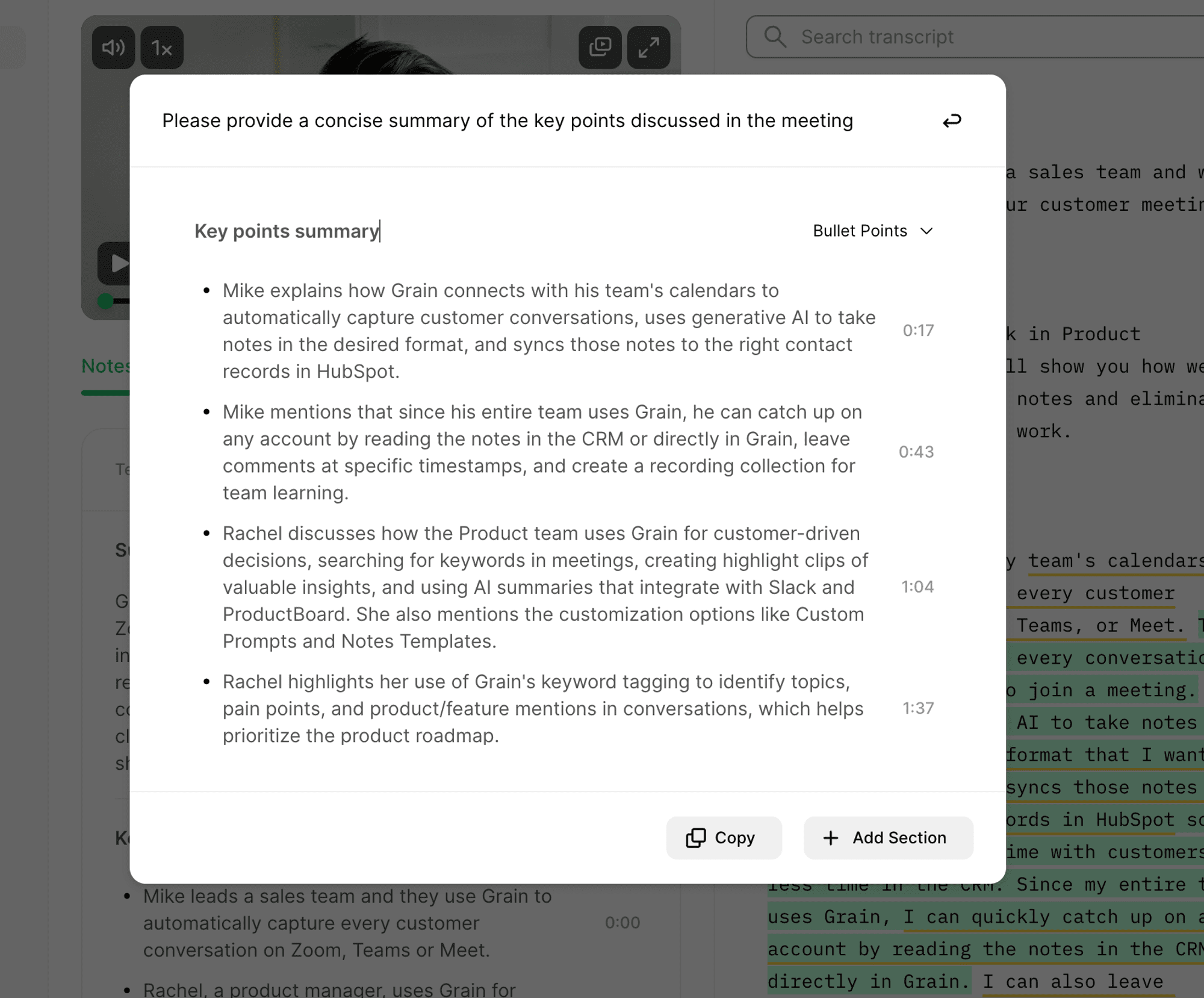
Multi-Meeting AI Insights
Neither platform currently offers multi-meeting AI insights, meaning users cannot track trends or analyze conversations across multiple meetings. This could be a limitation for teams looking to gain broader insights from aggregated meeting data.
Tools like tl;dv, Otter, and Gong do provide multi-meeting intelligence for teams that want to take their conversational insights to the next level.
Keyword Tracking
Both platforms offer keyword tracking, but only in their higher-tier plans: Fathom includes it in its Team edition, while Grain requires the Business Plan. This feature allows users to monitor specific terms or topics, making it easier to track recurring themes across meetings.
Speech Analytics
Fathom and Grain both include speech analytics, offering insights into factors like talk time and engagement to help teams assess meeting effectiveness. This feature is a huge aid for sales coaching too, as it allows coaches to get a high-level overview of their reps’ performances.
Automation & Integration Capabilities
| Fathom (8) | Grain (4) | |
|---|---|---|
| CRM Integrations | 🟢 | 🟠 in Business plan |
| Email Integrations | 🟢 | 🔴 |
| Zapier Integrations | 🟢 in Team Pro plan | 🟢 in Starter plan |
| Post-Meeting summary email | 🟢 automatic | 🟠 1-click |
| Schedule Reports | 🔴 | 🔴 |
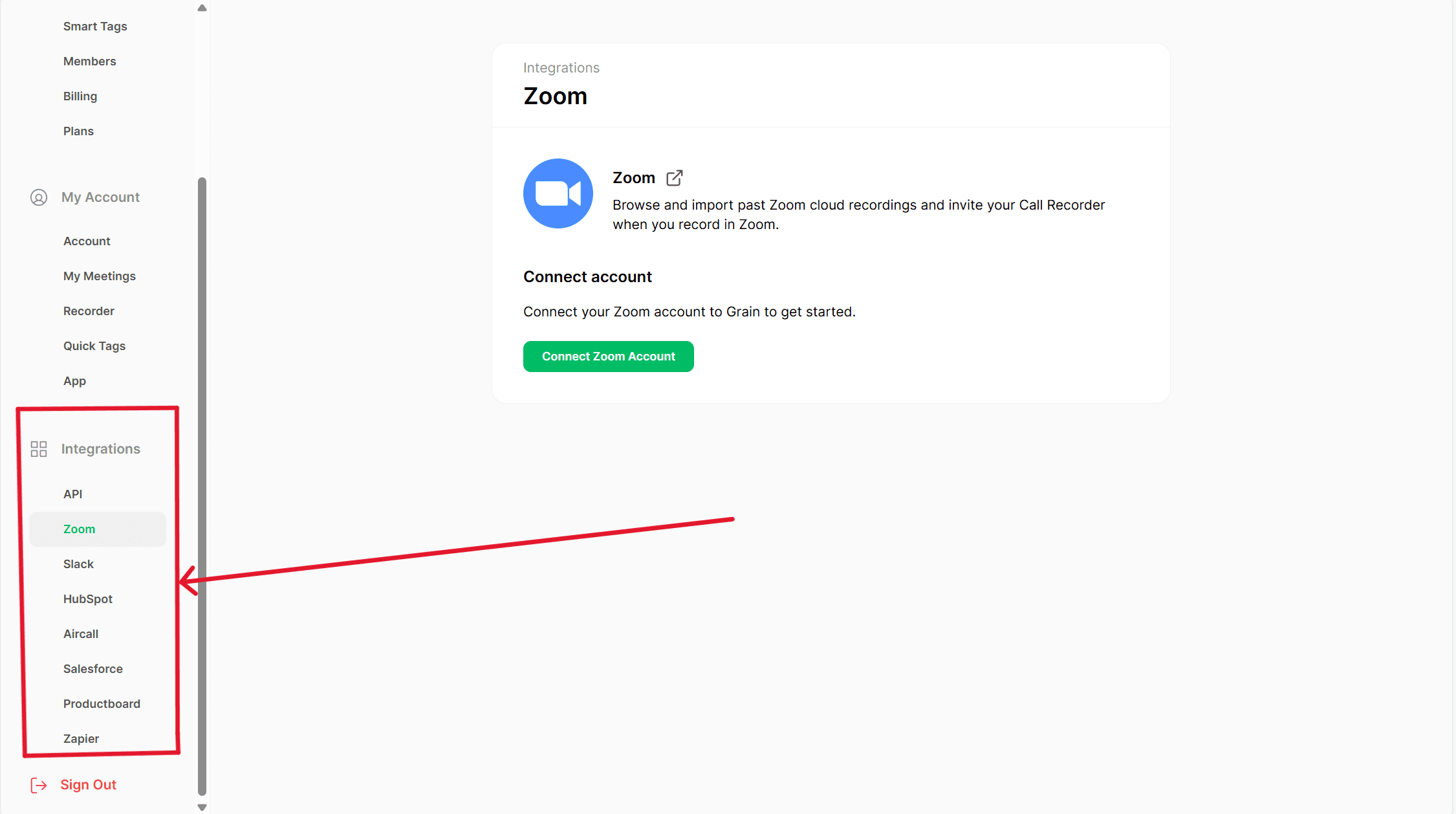

CRM Integrations
Fathom offers CRM integrations across all its plans, enabling users to sync meeting insights and action items directly into platforms like Salesforce and HubSpot.
Grain also provides CRM integrations, but this is only unlocked in its higher-tier Business plan, making it less accessible for smaller teams or individuals.
Email Integrations
Fathom provides direct email integrations, allowing users to streamline workflows by automatically sending meeting summaries or key takeaways to relevant stakeholders.
Grain, on the other hand, lacks built-in email integrations, which may be a drawback for teams that rely on email-driven workflows.
Zapier Integrations
Both platforms support Zapier integrations, enabling users to connect their meeting data with thousands of other apps. However, Fathom restricts this feature to its Team Pro plan, whereas Grain includes it in the more accessible Starter plan.
Post-Meeting Summary Email
Fathom automatically sends post-meeting summaries via email, ensuring that participants receive key takeaways without any extra steps.
Grain also offers this feature, but users must manually trigger the email with a one-click action, adding a slight inconvenience.
Schedule Reports
Neither Fathom nor Grain currently supports scheduled reports, meaning users cannot automate recurring meeting insights or analytics over time.
This is a particularly useful feature for managers that want to stay on top of their team’s performance. Grain and Fathom competitors like tl;dv provide this feature along with multi-meeting intelligence for deep and relevant regular insights.
Note-taking Capabilities
| Fathom (8) | Grain (8) | |
|---|---|---|
| AI Notes | 🟢 | 🟢 |
| Manual notes during calls | 🟢 | 🟠 needs app (Zoom only) |
| Tag people in notes | 🔴 | 🔴 |
| Assign tasks | 🟢 in Team plan | 🔴 |
| AI Tags / Bookmarks | 🟢 | 🟠 (Business+) |
| Comments | 🔴 | 🟢 |
| Custom Meeting Templates | 🔴 | 🟢 |
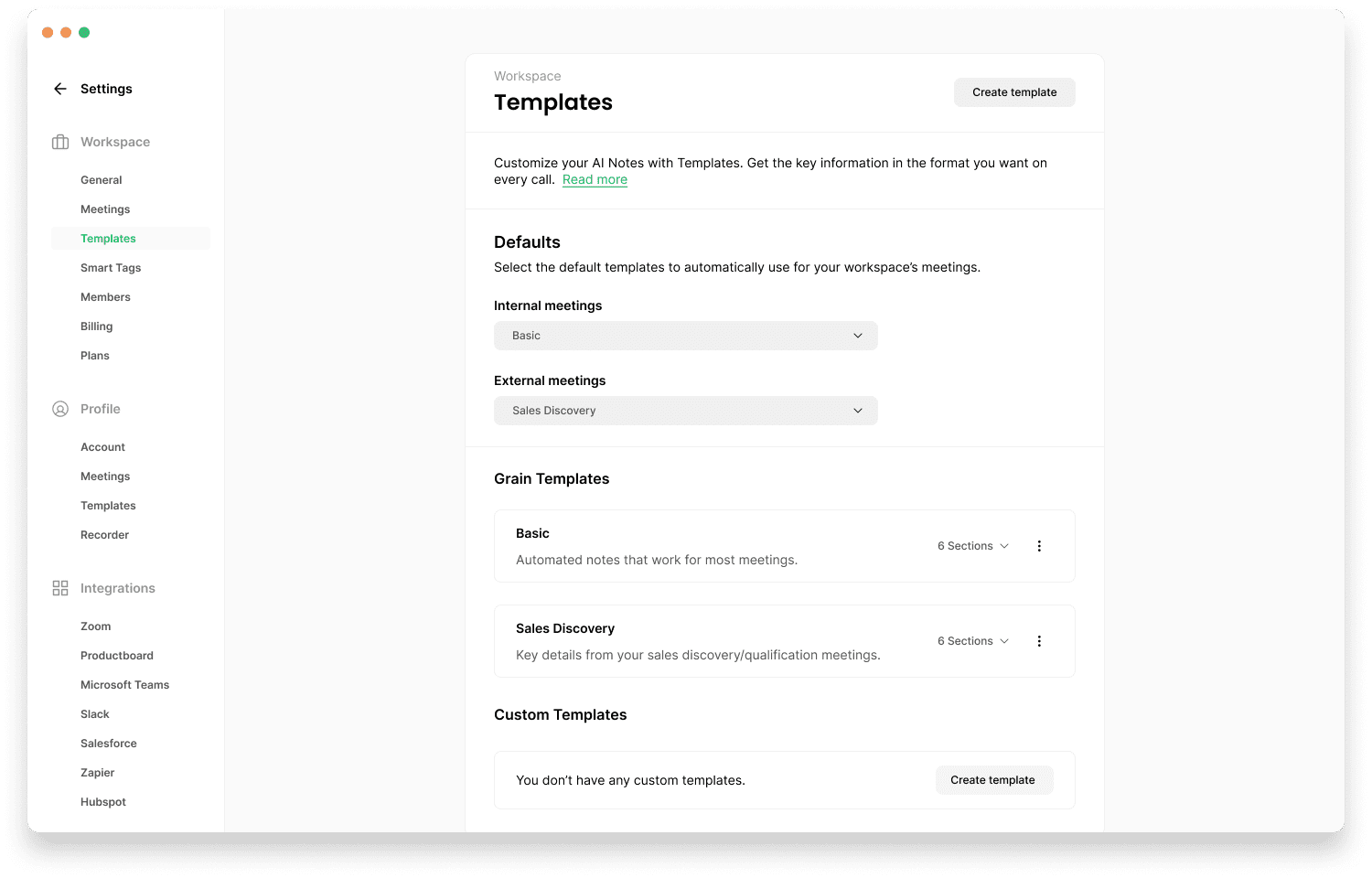
AI Notes
Both Fathom and Grain offer AI-generated notes, helping users automatically capture key points from meetings without manual effort. This feature ensures that important insights are documented, making follow-ups easier.
Manual Notes During Calls
Fathom allows users to take manual notes directly within the platform during meetings. Grain also supports manual note-taking but requires a separate app for this functionality, and it’s limited to Zoom. This makes Fathom the more flexible option for users who rely on real-time note-taking across multiple platforms.
Tag People in Notes
Neither Fathom nor Grain currently supports tagging people in notes, meaning users cannot directly assign insights or action items to specific individuals within the meeting notes. It makes collaboration weaker overall on both platforms.
Assign Tasks
Fathom enables task assignments within its Team plan, allowing users to turn meeting discussions into actionable next steps. Grain lacks this feature entirely, which may be a disadvantage for teams looking to manage follow-ups directly within their meeting notes.
AI Tags / Bookmarks
Both platforms offer AI-powered tagging and bookmarking, but Fathom includes it as a standard feature, while Grain restricts it to Business+ plans. This makes Fathom a more accessible option for users looking to categorize and retrieve key moments efficiently.
Comments
Grain supports comments within meeting notes, allowing users to collaborate and discuss insights directly in the platform. Fathom does not currently offer a commenting feature, drastically limiting its collaborative note-taking capabilities.
Custom Meeting Templates
Grain provides custom meeting templates, allowing users to standardize note-taking for recurring meetings. If there’s a specific way you’d like to record all your meeting notes, you can give Grain’s AI the template, and it’ll format your notes this way for all filtered calls. This is great for automatic syncing with CRMs too as you can customize the way in which Grain formats meeting notes to match with the fields that require data input in your CRM system.
This feature is missing from Fathom, making Grain the better choice for users who prefer structured meeting documentation.
Security Capabilities
| Fathom (8) | Grain (8) | |
|---|---|---|
| Data retention | 🔴 not disclosed | 🔴 not disclosed |
| SOC2 Compliant | 🟢 | 🟢 |
| SAML-based SSO | 🟢 Only on Team | 🟢 Only on Enterprise |
| GDPR Compliant | 🟢 | 🔴 not disclosed |
| EU AI Act Compliant | 🔴 not disclosed | 🔴 not disclosed |
| Uses your data to train AI | 🟢 No, your data is kept private | 🟢 No, your data is kept private |
| Private storage | 🔴 not disclosed | 🔴 not disclosed |
| Anonymized sensitive data sent to LLMs | 🔴 not disclosed | 🟢 |
| Meeting data chunking and randomizing | 🔴 not disclosed | 🔴 not disclosed |
| BAA with LLM providers | 🔴 not disclosed | 🔴 not disclosed |
| 0-day data retention policy with vendors | 🔴 not disclosed | 🔴 not disclosed |
Data Retention
Neither Fathom nor Grain discloses specific details about their data retention policies, which is a key consideration for users concerned with long-term data storage practices. Both platforms fall short in providing transparency on how long meeting data is kept, which may be a point of concern for security-conscious teams.
SOC2 Compliance
Both Fathom and Grain are SOC2 compliant, meaning they adhere to strict standards regarding data security, availability, confidentiality, and privacy. This ensures that both platforms meet the high-security standards needed for handling sensitive information, providing peace of mind for organizations looking for reliable and secure tools.
GDPR Compliant
Fathom is GDPR compliant, which is essential for users in the EU or those handling European data. In contrast, Grain does not disclose its compliance with GDPR, which could be a significant drawback for users prioritizing data protection regulations in the European market.
EU AI Act Compliant
Neither Fathom nor Grain has disclosed compliance with the EU AI Act, which governs the use of AI technologies within the European Union. This lack of disclosure raises concerns for users operating in or dealing with clients in the EU, where AI regulation is becoming increasingly important.
Uses Your Data to Train AI
Both platforms prioritize user privacy, with Fathom and Grain ensuring that they do not use customer data to train their AI models. This commitment to privacy ensures that sensitive meeting data remains protected, which is an important aspect for organizations concerned with the misuse of their data.
Anonymized Sensitive Data Sent to LLMs
Fathom does not disclose whether sensitive data is anonymized when sent to large language models (LLMs) for processing. Grain, however, clarifies that it anonymizes sensitive data before sending it to LLMs, which provides additional security and privacy assurances for teams that value data anonymization.
BAA with LLM Providers
Neither platform discloses whether they have a Business Associate Agreement (BAA) with their LLM providers, which would typically be required in industries governed by strict health data regulations, such as healthcare. This lack of clarity is a significant drawback for security-conscious teams, a.k.a all teams.
0-Day Data Retention Policy with Vendors
Fathom and Grain both lack transparency on whether they enforce a 0-day data retention policy with their vendors, which could be a critical factor for teams concerned about data retention after processing. This uncertainty may be a red flag for those who prioritize rapid data disposal practices to ensure privacy.
Coaching Capabilities
| Fathom (0) | Grain (2) | |
|---|---|---|
| Scorecards | 🔴 | 🟢 |
| Custom Playbooks | 🔴 | 🔴 |
| Template Playbooks | 🔴 | 🔴 |
| Objection Handling | 🔴 | 🔴 |
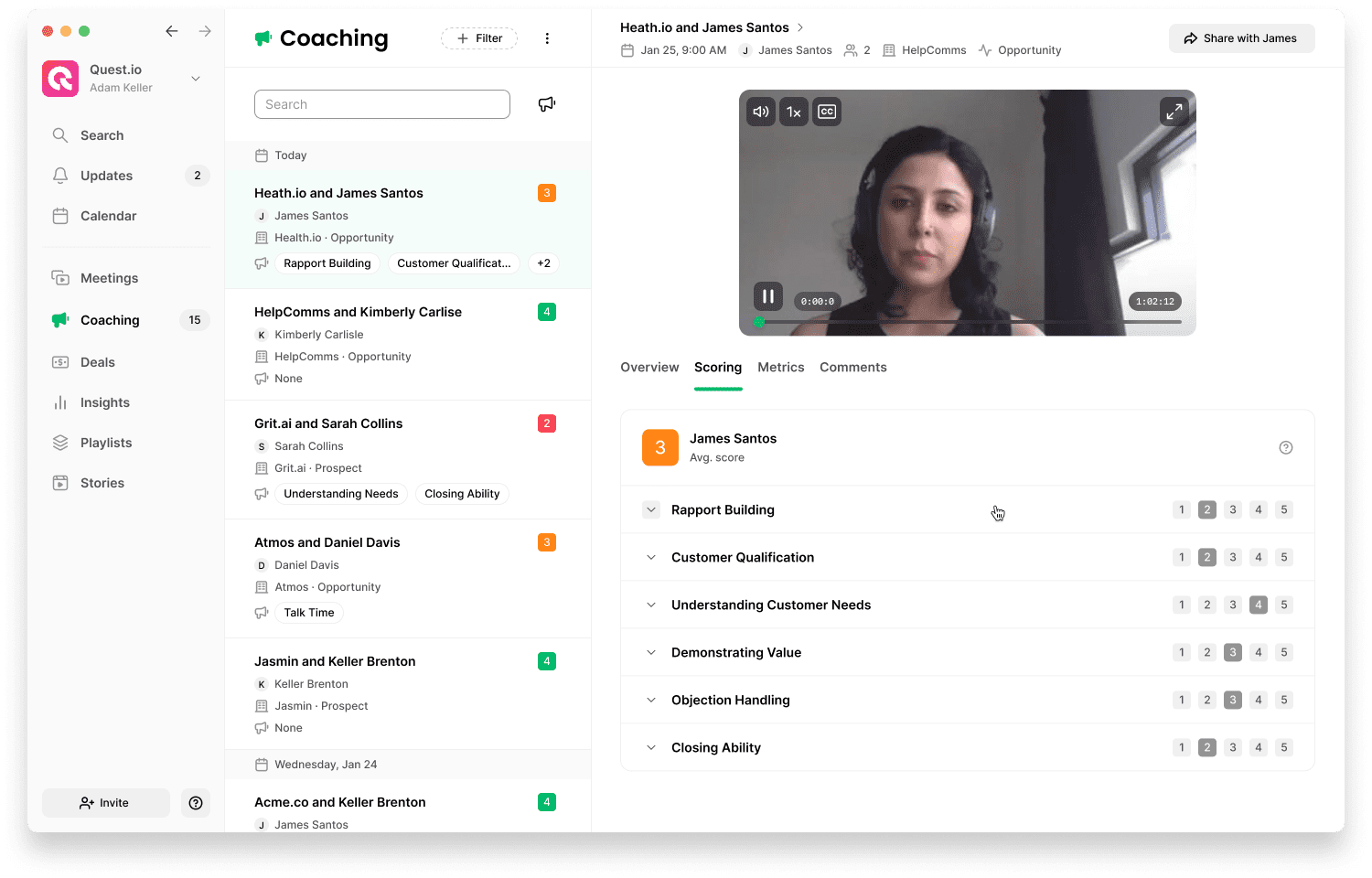
Scorecards
Grain offers a Scorecards feature, which is a tool that allows users to evaluate and track performance during meetings or calls, providing a structured way to measure success against predefined criteria. This feature can be beneficial for sales teams, managers, and others who want to assess the effectiveness of their conversations.
Fathom, however, does not offer this feature, meaning users seeking scorecard functionality will need to look elsewhere or rely on manual tracking.
Custom Playbooks
Neither Fathom nor Grain offers custom playbooks, a feature that would allow users to create personalized coaching or training guides tailored to specific scenarios or strategies. Custom playbooks can be particularly helpful in coaching environments where teams or individuals need detailed, customizable workflows for handling different situations. This absence on both platforms limits the ability to fully customize coaching content within the tools.
Template Playbooks
Both platforms also lack template playbooks, which would provide users with pre-designed frameworks for coaching, sales, or training sessions. Having templates, like BANT or MEDDIC, would save time for users who want quick setups without building their playbooks from scratch. The absence of this feature on both platforms means that users would need to develop their own materials or seek out third-party options.
Objection Handling
Similarly, neither Fathom nor Grain provides a dedicated objection handling feature. Objection handling is a key element in coaching, especially in sales environments, as it helps guide users on how to handle pushback during calls or meetings. The lack of this feature means that teams may need to rely on external resources or manual methods to manage objections.
For a tool that provides all of the above sales coaching features, you might be better off looking at tl;dv, Gong, or Modjo.
Admin Capabilities
| Fathom (2) | Grain (4) | |
|---|---|---|
| Apply auto-record of all meetings in the team members’ calendar | 🔴 | 🟠 (your meetings only) |
| Apply auto-share of meetings recorded by team members | 🔴 | 🟠 (your meetings only) |
| Prevent Deletion | 🔴 | 🔴 |
| Admin rights over all recordings | 🟢 | 🟢 |
Apply Auto-Record of All Meetings in the Team Members’ Calendar
Grain offers a limited version of auto-recording meetings, where users can enable automatic recording for their own meetings only. This functionality is useful for streamlining meeting management, ensuring no meeting is missed, and improving overall productivity. It means that individual users can share their recordings with admins, but that admins don’t have control over it.
Fathom does not provide an auto-recording feature for team members’ calendars, meaning users have to manually record meetings, potentially causing missed opportunities for automatic meeting captures.
Apply Auto-Share of Meetings Recorded by Team Members
Similarly, Grain allows users to auto-share their recorded meetings but again, only for their own meetings. This feature ensures that once a meeting is recorded, it is automatically shared with relevant team members, reducing the need for manual sharing and improving team collaboration. Unfortunately, admins can’t enforce auto-share on their team members’ meetings. It has to be done individually.
Fathom does not offer this feature at all, leaving users to manually share recordings. This could slow down the sharing process, especially in a fast-paced team environment.
Prevent Deletion
Neither Fathom nor Grain provides the ability to prevent deletion of recordings, which could be a crucial feature for organizations that need to retain all meeting records for legal, compliance, or organizational purposes. This missing functionality means that there is no protection against accidental or intentional deletion of critical meeting data in both platforms.
Admin Rights Over All Recordings
Both Fathom and Grain offer admin rights over all recordings, giving admins control over all recordings within their organization. This feature is vital for managing access, ensuring appropriate permissions, and maintaining oversight of all meeting content. Both platforms perform equally well in this area, allowing admins to have full control and oversight of all recorded meetings.
Organizational Capabilities
| Fathom (9) | Grain (12) | |
|---|---|---|
| Team Workspaces | 🟠 Team edition | 🟢 |
| Meetings Library | 🟢 | 🟢 |
| Smart Filters | 🔴 | 🟢 |
| Global Search | 🟢 | 🟢 |
| Search within meetings | 🟢 | 🟢 |
| Folders | 🟢 | 🟢 |
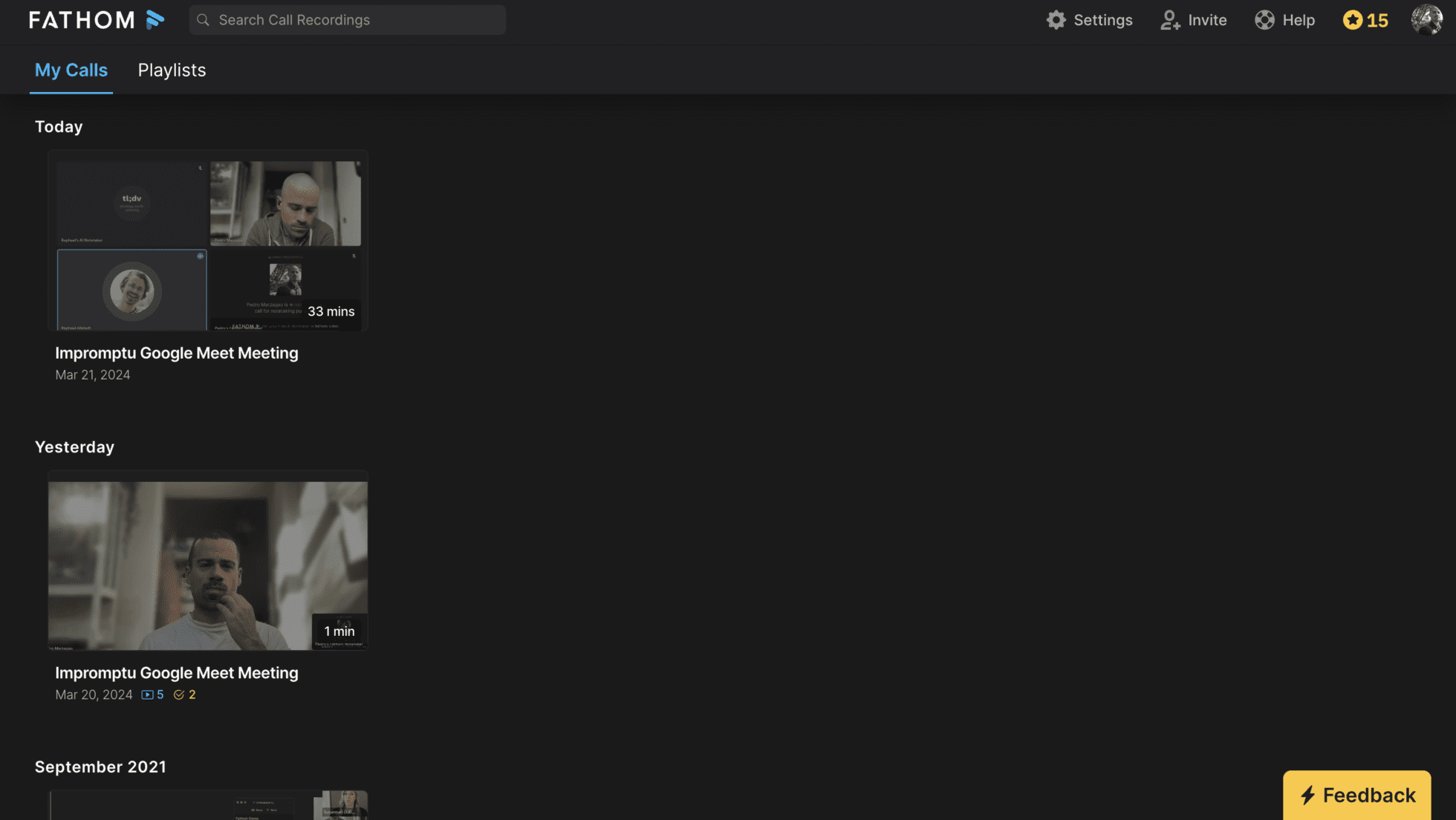
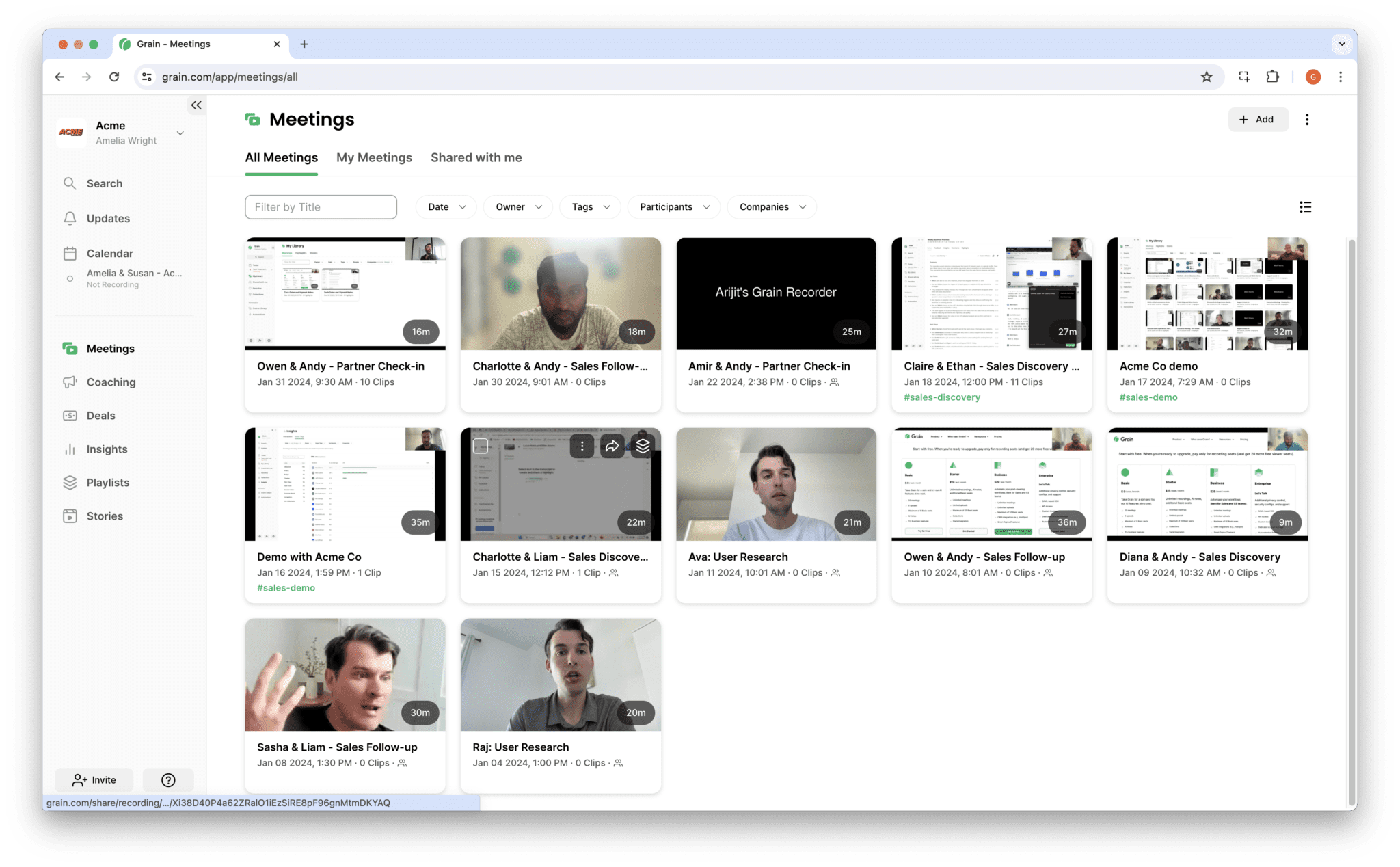
Support Capabilities
| Fathom (4) | Grain (3) | |
|---|---|---|
| Support in Free Plan | 🟢 email in Free plan | 🟢 email in Free plan |
| Priority Support | 🟢 in Team plan | 🟠 in Enterprise plan |
Support in Free Plan
Both Fathom and Grain provide email support in their free plans, offering users access to assistance without requiring a paid subscription. This feature is valuable for individuals or small teams who need basic support without committing to a paid plan. Both platforms make support accessible to users at no additional cost, ensuring that even those on the free tier can get help when needed.
Priority Support
Fathom offers priority support in its Team plan, providing faster response times and higher-priority attention for users on this plan. This is a key feature for teams that require swift resolution of issues and need a higher level of customer service.
In contrast, Grain only provides priority support for its Enterprise plan, which limits access to this service for higher-tier subscribers. This makes Fathom a more appealing option for teams on mid-tier plans that require prioritized support.
Revenue Intelligence Capabilities
| Fathom (0) | Grain (3) | |
|---|---|---|
| Forecasting | 🔴 | 🟠 Can view basic deal health but not predict future sales outcomes |
| Deal execution | 🔴 | 🟢 |
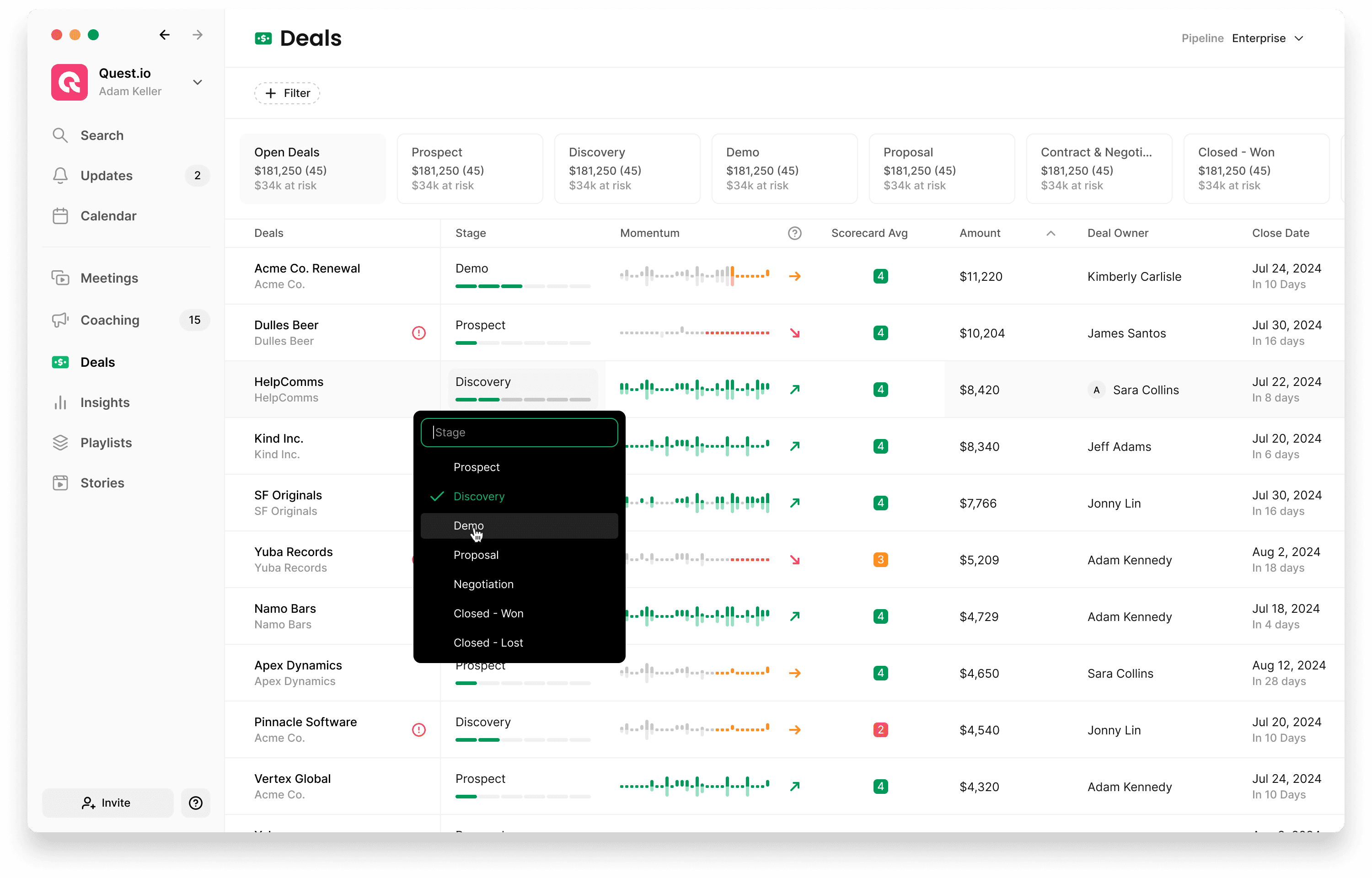
Forecasting
Fathom does not currently offer any forecasting capabilities, meaning it lacks tools to predict future sales outcomes based on current data or trends. This could be a limitation for teams looking to use the platform for sales planning or predictive analytics.
On the other hand, Grain offers basic deal health visibility in its platform, although it doesn’t have full forecasting capabilities to predict future sales outcomes. This feature allows users to get an overview of the current state of their deals and assess whether they’re on track to meet their goals. This can be helpful for identifying whether a deal is healthy or at risk, but it doesn’t go as far as predicting future outcomes. Still, this limited insight is better than Fathom’s absolute zero insight.
Deal Execution
Grain stands out in this category by providing deal execution tools, which help users manage and track the progress of deals from inception to closing. This feature supports sales teams in optimizing the efficiency and success of their deal-making process. Grain has detailed deal timelines, customizable filters, and engagement insights so teams can effectively manage and advance their deals.
Unfortunately, Fathom does not offer any similar functionality in this area.
Who Is It For?
| Fathom (6) | Grain (3) | |
|---|---|---|
| G2 Rating | 🟢 5 | 🔴 4.6 |
| Ease of set up | 🟢 Great free plan for individuals but confusing plans for teams | 🟠 Easy, but limited free plan |
| Localized platform | 🔴 | 🔴 |
| Best suited for whom | 🟢 SMB Sales | 🟢 SMB Sales |
Fathom outshines Grain when it comes to this final category, scoring an unbeatable 5/5 on G2 from almost 5,000 reviews. It’s worth mentioning that some reviewers claim to have left a five star review in exchange for additional features, so take the perfect score with a grain of salt.
It has to be said though that Fathom is also the easier of the two tools to get started with. While Grain has an intuitive user interface and is easy to get started with, it’s Fathom’s free plan that is in a league of its own compared to Grain’s limited one.
Both platforms are ideal for small-to-mid-sized businesses, and especially for sales teams. Grain, in particular, is great for sales teams due to its AI scorecards and Deals dashboard. However, both tools struggle when it comes to multilingual support. Neither Fathom nor Grain has a localized platform in any language other than English. This means that multinational teams may find it awkward to use their non-optimized foreign websites.
Verdict: Fathom vs Grain – Which One Is the Best?
| Fathom | Grain | |
|---|---|---|
| Transcription | 19 | 22 🟢 |
| Recording | 12 | 14 🟢 |
| Conversational Intelligence | 11 | 11 |
| Automation & Integrations | 8 🟢 | 4 |
| Note-taking | 8 | 8 |
| Security | 8 | 8 |
| Coaching | 0 | 2 🟢 |
| Admin | 2 | 4 🟢 |
| Organizational | 9 | 12 🟢 |
| Support | 4 🟢 | 3 |
| Revenue Intelligence | 0 | 3 🟢 |
| Other | 6 🟢 | 3 |
| Total | 87 | 94 🟢 |
In the Fathom vs Grain showdown, the scales tip slightly in Grain’s favor, with a total score of 94 compared to Fathom’s 87. Grain edges out Fathom in several key areas, including transcription, recording, coaching, admin, and organizational capabilities, where it secures the lead with solid features and a slightly better offering in each category.
Grain’s strength in transcription and recording is particularly notable, giving it a competitive edge for teams that prioritize high-quality meeting capture. The coaching capabilities in Grain also stand out, offering scorecards and speaker analytics that can help refine sales team performance and strategy.
Ultimately, Grain is the best fit for teams looking for a more well-rounded solution that offers a mix of transcription, recording, coaching, and organizational features. Its ease of setup, user-friendly interface, and comprehensive feature set make it a solid choice for SMB sales teams that need a versatile tool for managing meetings and boosting team performance.
Fathom, while slightly behind in the overall comparison, remains a strong contender for SMB sales teams that place a high premium on recording and automation capabilities, and want a more streamlined, secure environment with a solid free plan.
In conclusion, while Grain takes the slight edge with a total of 94 points, Fathom still holds its ground as a competitive option for those in search of a comprehensive, automated meeting capture solution.

